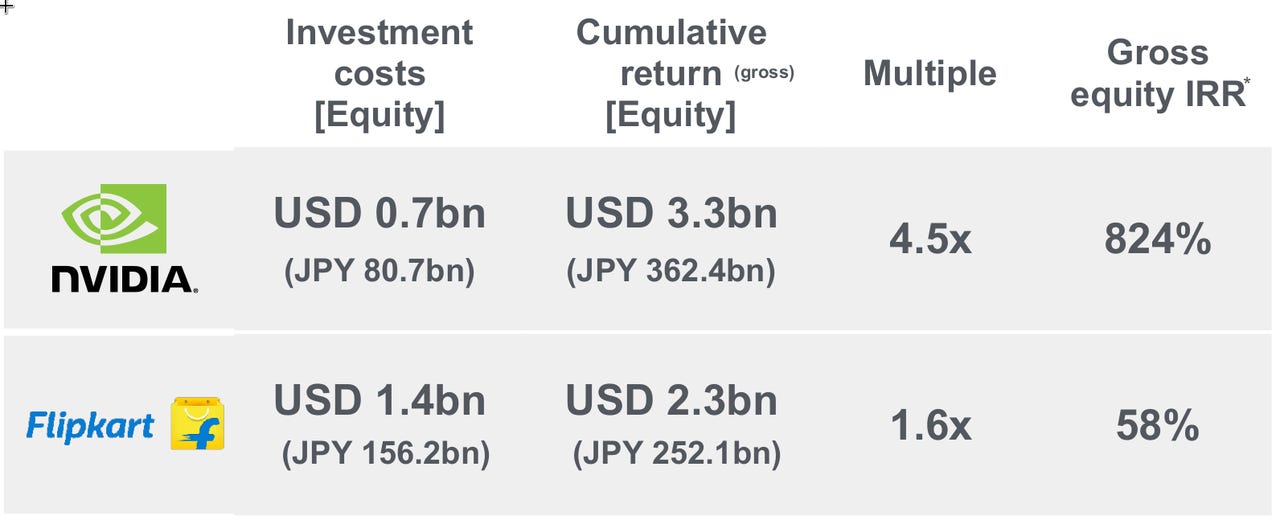SoftBank sells off Nvidia and Flipkart stakes to bank $5.6 billion in exits for 2018


For the nine months to the end of the December, SoftBank has made a cumulative return of $5.6 billion for its 2018 fiscal year, made up of $3.3 billion from selling its stake in Nvidia, and $2.3 billion selling its shares in Flipkart.
SoftBank said its SoftBank Vision Fund completed the Flipkart exit in August, and sold off its Nvidia stake last month.
With Nvidia, SoftBank had a total investment cost of $2.9 billion made up of $0.7 billion in equity, $0.5 billion in preferred equity, and a $1.7 billion margin loan at August 2017. By the end of August, its equity had risen to $3.3 billion, with the same size of preferred equity and margin loan.
SoftBank pointed out that from Nvidia's $281 peak share price on September 28 to the end of December 2018, when it sat at $134, its investment valuation had fallen by $4 billion. Through the use of derivatives via a collar transaction, it was able to recover $2.9 billion.
In May, Walmart took control of Flipkart for $16 billion, of which SoftBank had a 20 percent share.
SoftBank said that thanks to the 43.68 percent taxation rate on short-term capital gains in India, it had paid 65 million yen in tax on the Flipkart transaction.
Overall, the SoftBank Vision Fund investment vehicle had valuation gain of 693 billion yen for the nine months to the end of 2018, based on increases in valuations of Uber, WeWork, and Oyo.
Speaking during an earnings briefing on Wednesday, SoftBank Group CEO Masayoshi Son said the Vision Fund had made investments in over 70 companies, most of which were unicorns and focused in some way on artificial intelligence.
In its Arm chip-designing division, adjusted earnings before interest, tax, depreciation, and amortisation (EBITDA) was down from 24 billion yen last year to 10 billion yen for the nine months to December 31, this year, mostly due to taking a 176 billion yen hit from selling 51 percent of Arm China to create a joint venture.
Net sales for Arm were down four percent, and technology licence revenue dropped by 28 percent year on year. SoftBank said the drop was due to a delay of new contracts being signed in China during the first half of the year. Once signed, revenue returned to normal.
From its telco holdings, SoftBank Corp reported a 0.6 percent increase in adjusted EBITDA to 986 billion yen for the nine-month period, with sales growing by 4 percent, and US telco Sprint increased its EBITDA by 15 percent to 1 trillion yen for the three quarters to December 31 as sales grew 2.7 percent.
SoftBank said that the new revenue standards which dropped average revenue per user (ARPU) by 96 cents, and the increasing uptake of smartwatches and automotive data devices which have lower ARPU than handsets, has made overall postpaid phone ARPU $50, and postpaid ARPU sit at $43.64.
For the conglomerate in total, SoftBank Group recorded 7.2 trillion yen in net sales, up 5 percent, and a 62 percent boost in operating income to 1.8 trillion yen for the nine months to the end of 2018. Net income for SoftBank Group was 1.57 trillion yen, an increase of 31 percent.
During that time, SoftBank Group reduced its ownership in SoftBank Corp from 99.99 percent to 66.49 percent.
Related Coverage
Cleaning machine: SoftBank brings AI to a dirty job
SoftBank sees robotics opportunity in Japan's labor shortage, and an American AI firm is steering the way.
SoftBank touts Saudi-backed Vision Fund as driving profit spike
The company will continue its relationship with Saudi Arabia following the murder of Jamal Khashoggi.
Toyota and SoftBank team up for on-demand vehicles and autonomous driving
Starting with on-demand vehicles, the pair are aiming at autonomous vehicles by the middle of next decade.
Alibaba Cloud opens second data centre in Japan
Chinese cloud vendor launches another data centre that will more than double its current capacity in Japan, where it says there is growing demand for big data analytics with machine learning capabilities.
SoftBank invested 'almost nothing' in Pepper robot security, creating huge business risk (TechRepublic)
Researchers claim that Pepper was commercialized before it was ready, and that 'the manufacturer extensively neglected any sort of security assessments.'